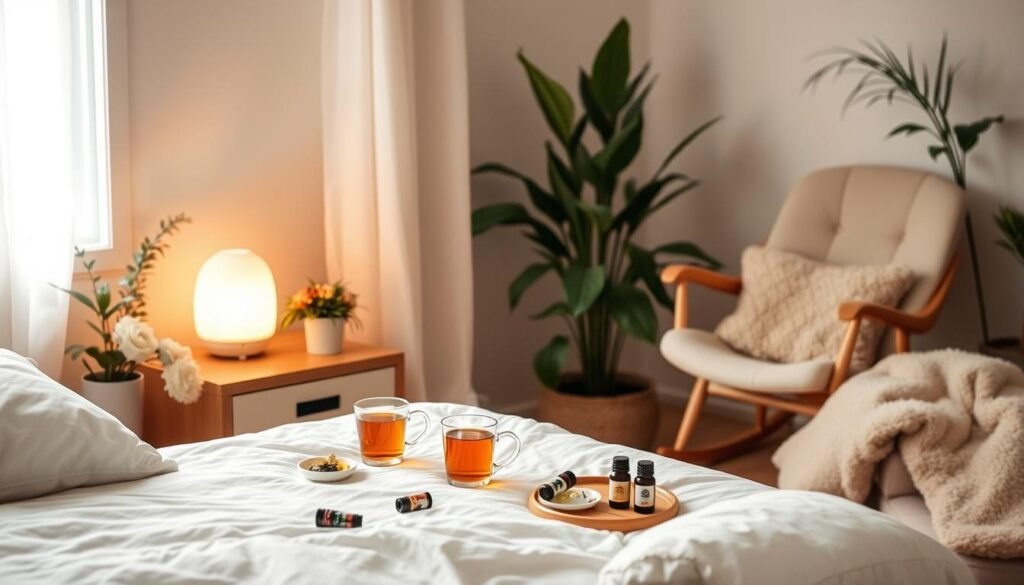Did you know up to 30% of adults face insomnia today? This fact shows how common sleep problems are in our busy lives. People are turning to herbal insomnia treatments. These natural remedies help improve sleep and offer kinder options for our health.
Changing your lifestyle and trying herbal solutions can greatly help. Chamomile tea and valerian root can calm you and help you sleep better. They avoid the negative effects often seen with sleep drugs.
Check out natural remedies to find out how they can help you sleep better. Herbal treatments, combined with good sleep habits, can change how you deal with insomnia.
Key Takeaways
- Insomnia affects 10% to 30% of adults, making effective treatments necessary.
- Herbal insomnia treatments offer a natural alternative to pharmaceutical options.
- Chamomile tea can enhance relaxation and sleep quality.
- Adopting a regular sleep schedule helps regulate sleep cycles.
- Integrating herbal remedies may mitigate insomnia symptoms without severe side effects.
- Creating soothing bedtime rituals can contribute significantly to improved sleep.
Understanding Insomnia and Its Impact
Insomnia is a big challenge for many in the United States, with sleep issues on the rise. Around 60 million Americans deal with insomnia, which impacts their daily lives and health. Knowing more about insomnia helps us understand its effects better.
Prevalence of Sleep Disorders in America
Sleep disorders are surprisingly common, especially among new mothers who struggle with sleep. Studies show that after giving birth, over two-thirds report not sleeping well within six months. Newborn needs like feeding and diaper changing disrupt sleep a lot. Also, more than 33% of pregnant women have severe insomnia symptoms, showing how widespread this issue is.
Consequences of Poor Sleep Quality
Poor sleep does more than make you tired. Those with insomnia often wake up at night and feel their sleep wasn’t restful. This leads to feeling tired all day, being irritable, and poorer mental health. Poor sleep is also linked to serious health problems. These include heart disease, obesity, anxiety, and depression. For new moms, managing sleep is vital as their sleep issues can be more severe.
Understanding the impact of insomnia is crucial. It helps us find better treatments and support for those struggling.
Natural Remedies for Insomnia
There’s a growing interest in natural remedies for insomnia. Many prefer herbal solutions over traditional sleep meds. These options seem gentler and there’s less worry about side effects compared to pharmaceuticals. Yet, we should note that there’s limited scientific evidence on these remedies.
Benefits of Herbal Approaches
Herbal remedies are seen as safer, natural ways to improve sleep quality. Here are some key advantages:
- Gentle Effects: They’re often milder, with less risk of becoming dependent unlike some prescription drugs.
- Variety of Options: There’s a broad selection of herbs, offering choices that cater to personal preferences.
- Holistic Benefits: Many herbs also boost overall health, tackling issues like stress and anxiety.
Effectiveness of Herbal Remedies
Though results can vary, some herbs show promise for improving sleep. This is especially true for those dealing with postpartum insomnia. Here are a few herbs that may help:
| Herb | Potential Benefits | Method of Use |
|---|---|---|
| Chamomile | Promotes relaxation, aids digestion | Tea or capsules |
| Valerian Root | Helps reduce the time to fall asleep | Tincture or tea |
| Ashwagandha | Reduces stress, supports calmness | Powder or capsules |
| Kava | Calming effects, may improve sleep onset | Tea or extract |
Herbal Ingredients for Enhancing Sleep Quality
Many people look towards herbal ingredients for sleep as natural ways to better their sleep. Chamomile, valerian root, ashwagandha, and kava are top picks. These herbs have special qualities that might help with sleep.
Chamomile: The Gentle Sleep Aid
Chamomile is known for its calming effect and is considered safe by the FDA as a chamomile sleep aid. Its relaxant power comes from flavonoids. Typically, it’s taken as tea, serving as a cozy pre-sleep routine with no adverse effects.
Valerian Root: A Sleep Supportive Herb
Valerian root is famous for possibly aiding users to fall and stay asleep. Some research shows it might work, with users reporting better sleep. Though reactions differ, valerian is a favored natural sleep support.
Ashwagandha: Stress Reduction and Sleep Improvement
Ashwagandha is praised for its stress-relieving and sleep-enhancing abilities. Studies suggest 300 milligrams twice daily may help you fall asleep quicker and improve sleep. Lowering stress plays a big part in achieving good sleep patterns.
Kava: Calming Effects and Considerations
Kava is celebrated for making people relaxed and might aid those with insomnia due to its kava calming effects. Although research shows positives for stressed individuals, one must be careful of its potential liver risks. It’s wise to talk to a doctor before trying kava for sleep.
If you want to learn more about these herbals and their benefits for sleep, check natural sleep aids for insights on their effectiveness and safety.
| Herb | Potential Benefits | Considerations |
|---|---|---|
| Chamomile | Safe sleep aid; calming properties | No known side effects |
| Valerian Root | Aids in falling and staying asleep | Mixed results in different studies |
| Ashwagandha | Reduces stress; improves sleep quality | Consult for proper dosing |
| Kava | Calming effects; supports sleep | Monitor for liver health |
Incorporating Natural Drinks for Better Sleep
Looking for natural drinks can seriously improve your sleep. Many drinks are known to calm and help you relax. They are great for your nightly routine.
Warm Milk and Its Sleep-Inducing Properties
Warm milk is a traditional remedy that helps many sleep better. It has tryptophan, which aids in producing melatonin. This hormone controls sleep. Drinking warm milk before bed is a comforting ritual that helps calm the body.
Chamomile Tea: A Cozy Nighttime Beverage
Chamomile tea is a perfect choice for relaxing. It doesn’t have caffeine and has properties that calm you, helping your mind and body get ready for sleep. The antioxidants in chamomile can also improve sleep quality.
Tart Cherry Juice: Supporting Melatonin Production
Tart cherry juice is known for boosting melatonin. It’s full of natural compounds beneficial for those with sleep issues. Having tart cherry juice in the evening could increase melatonin, making sleep easier.

Physical Activity and Sleep Quality
Regular physical activity improves both exercise and sleep quality. Studies show that exercise leads to deeper sleep and shorter time to fall asleep. This is especially helpful for those with sleep problems like chronic insomnia. Adding exercises to your daily routine can give you consistent sleep improvement.
The Role of Exercise in Sleep Improvement
Research highlights the key role of regular physical activity in sleep quality. Moderate aerobic exercise helps with longer sleep and better rest. For people with chronic insomnia, exercise helps them fall asleep faster and sleep longer. Even a single 30-minute workout session can make it easier to fall asleep. This shows that exercise directly impacts sleep quality.
Timing Your Workouts to Enhance Sleep
While exercising is good for sleep, when you do it matters. Working out too close to bedtime can make it harder to fall asleep. Experts suggest finishing exercise a few hours before bed to improve sleep. This gives your body time to recover and supports a better sleep cycle.
Melatonin and Its Role in Sleep Regulation
Understanding melatonin is key for those seeking better sleep. This hormone is vital in setting the sleep-wake cycle, signaling rest time to the body. Light exposure can disrupt melatonin production, leading to sleep issues. So, it’s important for good sleep.
Understanding Melatonin: A Natural Sleep Hormone
Melatonin is made in the pineal gland. Its levels go up in the evening, telling our bodies it’s time to relax. For people with psychiatric disorders, this is crucial. Melatonin imbalance can affect their sleep.
Research indicates melatonin improves sleep for those with bipolar disorder and autism. It helps with falling asleep faster, sleeping well, and sleeping more efficiently.
Using Melatonin Supplements Safely
Melatonin supplements can help with insomnia or uneven sleep patterns. But, starting them should be done carefully. Consulting healthcare providers is important to find the right dosage and timing.
Doses from 1 to 3 mg work well for certain conditions. Yet, some may need higher doses for jet lag or shift work sleep problems. Safety comes first, particularly for pregnant women and those with psychiatric conditions. So, talking to a doctor before using melatonin supplements is essential.

Creating an Ideal Sleep Environment
A good sleep setting is key to better sleep quality. This is especially true for those with postpartum insomnia. Small changes in the sleep environment can greatly help someone fall and stay asleep.
Optimal Temperature Settings for Sleep
Keeping your room at the right temperature is very important for good sleep. Experts found that 65-72°F is the best range for sleep. This helps your body stay at a comfortable temperature all night. Making your room cooler can be done by adjusting the thermostat, using fans, or choosing breathable sheets.
The Importance of a Dark Bedroom
A dark room is essential for good sleep. Light at night can mess with your sleep by disrupting melatonin, the sleep hormone. A darker bedroom signals your body that it’s sleepy time. You can make your room darker by using blackout curtains, turning off gadgets, and keeping lights low. Following these tips can improve your sleep habits a lot.
Postpartum Insomnia Treatment Options
New moms often struggle with sleep after having a baby. This is due to changes in hormones, stress, and the new duties of caring for a baby. By understanding these sleep issues, moms can find ways to sleep better.
Understanding Postpartum Sleep Challenges
About 12.8% of new moms face insomnia after childbirth. This is more common in women than men. Changes in the body, along with stress and worry, make sleeping hard. Also, there’s a link between not sleeping well and postpartum depression.
Natural Remedies for Postpartum Insomnia
Natural remedies can help moms sleep better. Herbal options like chamomile and valerian root are helpful for relaxation and better sleep. These remedies are getting more popular as women seek non-medical ways to deal with sleep problems. It’s smart to talk to a doctor before trying new remedies, especially if breastfeeding.
Postpartum Sleep Deprivation Help: Tips and Tricks
Handling postpartum insomnia means using smart tips and improving sleep habits. Here are some ideas:
- Avoid caffeine at least six hours before bedtime to promote better sleep.
- Limit naps to 30 minutes and avoid napping after 3 p.m. to reduce nighttime insomnia.
- Create a calming bedtime routine to signal your body it’s time to wind down.
- Optimize your sleep environment by making it dark, quiet, and cool.
- Engage in light physical activity during the day to improve overall sleep quality.

By following these tips, new moms can address insomnia effectively. This helps them cope with the sleep challenges that come with this new chapter in life.
| Tip | Description |
|---|---|
| Avoid Caffeine | Don’t consume caffeine 6 hours before sleep to enhance sleep quality. |
| Limit Naps | Restrict naps to 30 minutes and time them before 3 p.m. to prevent insomnia. |
| Create a Routine | Establish a relaxing pre-sleep routine to signal it’s time for rest. |
| Optimize Environment | Ensure the bedroom is dark, quiet, and cool for better sleep conditions. |
| Light Exercise | Incorporate light activity into daily routines to improve overall sleep patterns. |
Mind-Body Techniques for Better Sleep
Struggling with insomnia, many people look for effective ways to sleep better. Mind-body techniques offer a holistic approach. They combine relaxation and mindfulness to tackle both the physical and mental parts of sleep problems.
Relaxation Exercises for Sleep Improvement
Add relaxation exercises to your bedtime routine to help you fall asleep easier. Methods like progressive muscle relaxation, deep breathing, and gentle yoga calm the mind and lower stress. This makes it easier for both your body and mind to relax at night.
The Impact of Meditation and Mindfulness on Sleep Quality
Meditation has been shown to improve sleep. It works by increasing mindfulness and letting go of thoughts that keep you awake. By bringing a sense of peace, it helps you fall asleep more easily. Making these techniques part of your lifestyle can lead to better sleep and overall happier life.
Alternative Therapies for Insomnia
Looking for new ways to fight insomnia? Acupuncture and sleep hypnosis are worth considering. These methods don’t just tackle insomnia’s symptoms. They go deeper, aiming to solve the root problems causing bad sleep.
The Role of Acupuncture in Sleep Management
Acupuncture can help you sleep better. It involves stimulating specific body points to relax and improve sleep. After acupuncture, many people feel less anxious.
This calm feeling can lead to better sleep. It’s great for those whose sleep issues are linked to stress.
Exploring Sleep Hypnosis for Insomnia Relief
Sleep hypnosis has important benefits. It works well for those whose insomnia has mental blocks. The technique brings deep relaxation and changes harmful thought patterns around sleep.
With calming words and imagery, it guides you to a peaceful state. This makes sleep health better.
| Therapy Type | Mechanism | Key Benefits |
|---|---|---|
| Acupuncture | Stimulates meridian points | Reduces stress and anxiety |
| Sleep Hypnosis | Guided relaxation techniques | Alters negative thought patterns |
Adding these therapies to your wellness routine can boost sleep quality and health. Acupuncture and sleep hypnosis offer distinct advantages for overcoming insomnia. They’re great choices for those looking for insomnia relief.
Herbal Product Safety and Effectiveness
Exploring the world of herbal products means putting safety and effectiveness first. Quality herbs can greatly improve health, especially for those struggling with insomnia. It’s important to be careful and informed when choosing what to add to your wellness routine.
Choosing Quality Herbal Products
With so many herbal remedies out there, finding the good ones is key. To pick the best, remember to:
- Look for standardized labeling that shows the amount of active ingredients.
- Research reputable brands that are known for their strict quality checks.
- Check for third-party testing which confirms the product’s purity and strength.
Potential Drug Interactions with Herbal Remedies
Knowing about possible drug interactions with herbal remedies is crucial. Some herbs, like valerian, might not mix well with other meds, especially ones for sedation or depression. Some common concerns involve:
| Herbal Remedy | Potential Interactions |
|---|---|
| Valerian | Can amplify sedative effects of medications like benzodiazepines, leading to excessive drowsiness. |
| Ashwagandha | May interact with sedative drugs or medications affecting thyroid levels. |
| Passionflower | Could enhance the effects of other anxiety medications, requiring careful monitoring. |
| Skullcap | Might interact with other anxiety-reducing medications, necessitating caution in combined use. |
Talking to a healthcare provider before starting any herbal remedy is wise, especially if you’re already taking other meds. This step can make using herbal products safer. It also helps you sleep better and improve your overall health.
Conclusion
In summary, dealing with postpartum insomnia is key for better sleep and wellness. Using the right herbal treatments and natural cures can make a big difference. These methods are based on a summary of herbal treatments that help with sleep problems.
There are many ways to tackle sleep issues. Knowing about herbs, natural drinks, and mind-body practices is central. Cognitive behavioral therapy, for example, has shown success in lessening insomnia as seen in clinical studies.
Being informed about herbal supplements is crucial. It involves understanding their advantages and possible risks. People with postpartum insomnia can discover options that support health and rest. It’s all about moving toward improved sleep.
Pingback: Discover Effective Natural Cures for Insomnia – Biotinbloom
Pingback: Find the Best Medication for Insomnia – Biotinbloom
Pingback: Conquer Acute Insomnia: Proven Techniques for Restful Sleep – Biotinbloom
Pingback: What Helps with Sleep? Discover the Best Solutions – Biotinbloom
Pingback: Home Remedies for Insomnia – Biotinbloom
Pingback: Trouble Sleeping? Here’s What to Do When You Can’t Sleep – Biotinbloom
Pingback: Combating the Effects of Insomnia for Better Sleep – Biotinbloom
Pingback: Overcome Insomnia Naturally: Top Solutions for Better Sleep – Biotinbloom
Pingback: Overcome Insomnia Naturally: Proven Methods for Restful Sleep – Biotinbloom
Pingback: The Meaning of Insomnia Explained: Causes and Solutions – Biotinbloom
Pingback: Top Sleep Disorder Treatments for a Good Night’s Sleep – Biotinbloom
Pingback: What to Do When You Have Insomnia – Biotinbloom
Pingback: Insomnia Relief: Discover Natural Solutions – Biotinbloom
Pingback: The Most Effective Insomnia Medications to Help You Sleep Better – Biotinbloom
Pingback: Discover the Best Insomnia Remedy for You – Biotinbloom
Pingback: How to Go to Sleep with Insomnia – Biotinbloom
Pingback: Can’t Sleep at All? Proven Strategies to Get Better Sleep – Biotinbloom
Pingback: Trouble Sleeping Remedies: Your Guide to Restful Nights – Biotinbloom
Pingback: Natural Remedies to Overcome Insomnia and Sleep Better – Biotinbloom
Pingback: Why Can’t I Sleep? Understanding the Reasons – Biotinbloom
Pingback: Proven Strategies to Fall & Stay Asleep Easily – Biotinbloom
Pingback: Discover Natural Insomnia Cures: Sleep Better Tonight – Biotinbloom
Pingback: Overcome Insomnia Naturally: Proven Treatments to Try – Biotinbloom